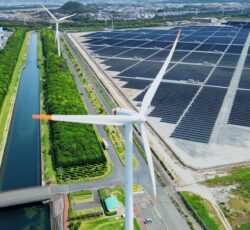On-Grid Solar Power: Harnessing Renewable Energy for Sustainable Electricity
On-grid solar power is a type of renewable energy that harnesses the power of the sun to produce electricity. It involves the installation of solar panels on residential or commercial properties that are connected to the traditional electricity grid. In this blog post, we’ll explore the benefits and importance of on-grid solar power in achieving sustainable electricity and reducing carbon emissions.
How Does On-Grid Solar Power Work?
On-grid solar power works by converting sunlight into electricity through the use of solar panels. The panels capture the energy from the sun and convert it into direct current (DC) electricity. The electricity is then sent to an inverter, which converts it into alternating current (AC) electricity that can be used to power homes and businesses.
The electricity generated by the solar panels is used first to power the property where it is installed. Any excess electricity is then sent back to the grid and can be used by other properties in the area. This excess electricity is tracked and credited to the property owner in the form of net metering, which can lower the property owner’s electricity bill.
Benefits of On-Grid Solar Power
1. Renewable Energy
On-grid solar power is a renewable energy source that harnesses the power of the sun to produce electricity. Unlike fossil fuels, solar energy is a clean and sustainable source of energy that doesn’t emit harmful pollutants into the environment.
2. Cost-Effective
On-grid solar power is a cost-effective solution for reducing electricity bills. While the initial cost of installation may be significant, the long-term savings can be substantial. With net metering, property owners can earn credits for excess electricity generated by their solar panels, which can lower their overall electricity bill.
3. Environmentally-Friendly
On-grid solar power is an environmentally-friendly solution for producing electricity. It reduces our reliance on fossil fuels and helps to reduce carbon emissions. By installing solar panels on residential and commercial properties, property owners can play a role in the global effort to reduce carbon emissions and combat climate change.
4. Low Maintenance
Solar panels require very little maintenance. Once installed, they can last for several decades with minimal upkeep. This makes them a hassle-free solution for producing electricity.
5. Energy Security
On-grid solar power provides energy security by reducing our reliance on the traditional electricity grid. During power outages, properties with solar panels and battery storage systems can still access electricity, providing peace of mind and comfort during emergencies.
Importance of On-Grid Solar Power in Achieving Sustainable Electricity
The use of on-grid solar power is an important step in achieving sustainable electricity. According to the International Energy Agency (IEA), renewable energy sources such as solar power are key to reducing carbon emissions and achieving a sustainable energy future.
On-grid solar power reduces our reliance on fossil fuels and mitigates the impact of climate change. By shifting our energy consumption from traditional electricity grids to renewable energy sources, we can reduce our carbon footprint and create a more sustainable future.
Conclusion
On-grid solar power is a clean, cost-effective, and environmentally-friendly solution for producing electricity. It harnesses the power of the sun and reduces our reliance on fossil fuels. By installing solar panels on residential and commercial properties, property owners can lower their electricity bills, reduce their carbon footprints, and contribute to a sustainable energy future.
As individuals, we can contribute to the use of on-grid solar power by considering the installation of solar panels on our properties. Governments can also provide incentives and policy support to encourage the use of solar power. Collectively, we can create a more sustainable future for ourselves and future generations by harnessing the power of renewable energy and reducing our carbon emissions.
